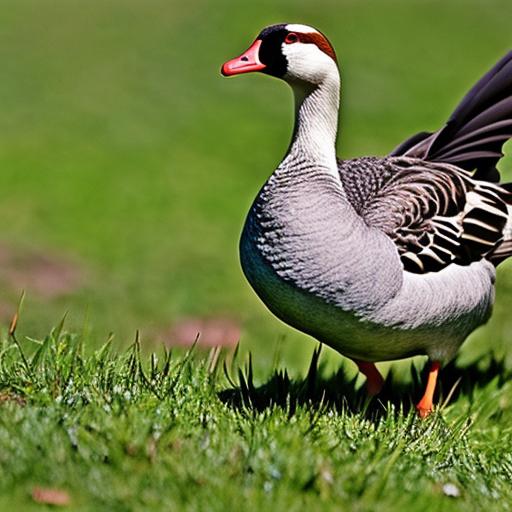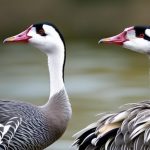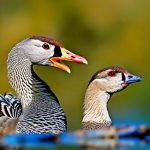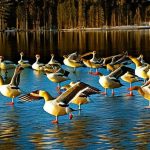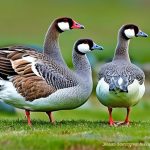Geese infestation is a common problem in many areas, causing damage to property, creating unsightly messes, and posing health risks. It is important to find effective ways to keep geese away in order to mitigate these issues. By understanding the behavior of geese and implementing various control measures, we can create a more harmonious environment for both humans and geese.
Key Takeaways
- Geese are social animals and tend to congregate in large groups.
- Physical barriers such as fences and netting can be effective in keeping geese away.
- Scare tactics such as loud noises and visual deterrents can also be used to deter geese.
- Repellents such as taste aversions and chemical sprays can be effective in keeping geese away.
- Landscaping with plants that geese dislike can be a natural way to deter them.
Understanding the Behavior of Geese
Geese are attracted to certain areas for various reasons. They are social animals and tend to gather in places where they feel safe and have access to food and water. Geese are particularly drawn to areas with open grassy spaces, such as parks, golf courses, and residential lawns. They also prefer areas near bodies of water, as they use these for nesting and feeding.
Geese have nesting and feeding habits that contribute to their attraction to certain areas. They typically build their nests near water, where they can easily access food and protect their young. Geese are herbivores and feed on grasses, grains, and aquatic plants. They are known to graze on lawns and crops, causing damage to vegetation.
The Importance of Creating Physical Barriers
One effective way to keep geese away is by creating physical barriers that prevent them from entering certain areas. Fences or netting can be installed around ponds or other bodies of water to keep geese from accessing these areas. These barriers should be at least three feet high to deter geese from attempting to fly over them.
Another option is the use of floating barriers on bodies of water. These barriers create a physical barrier that prevents geese from landing or swimming in the area. Floating barriers can be made from materials such as plastic or wire mesh and should be placed strategically to cover the entire surface of the water.
Using Scare Tactics to Deter Geese
Scare tactics can be an effective way to keep geese away. Geese are wary of unfamiliar objects or loud noises, so placing scare devices in areas where geese are likely to gather can deter them from staying. Scare devices can include visual deterrents such as scarecrows, reflective tape, or balloons with predator eyes painted on them. Auditory deterrents such as noise-making devices or recordings of predator calls can also be effective.
Another scare tactic is the use of trained dogs to chase away geese. Border collies, in particular, are known for their ability to herd and chase geese. The presence of a dog can create a sense of danger for geese and discourage them from staying in the area.
Implementing Repellents to Keep Geese Away
Repellents can be used to keep geese away by making the area unappealing or uncomfortable for them. There are various types of repellents available, including chemical repellents and natural repellents.
Chemical repellents can be applied to grassy areas to make them taste unpleasant to geese. These repellents typically contain a bittering agent that discourages geese from grazing on the treated area. Natural repellents, on the other hand, use ingredients such as garlic or hot pepper to create an unpleasant scent or taste for geese.
The Benefits of Landscaping to Deter Geese
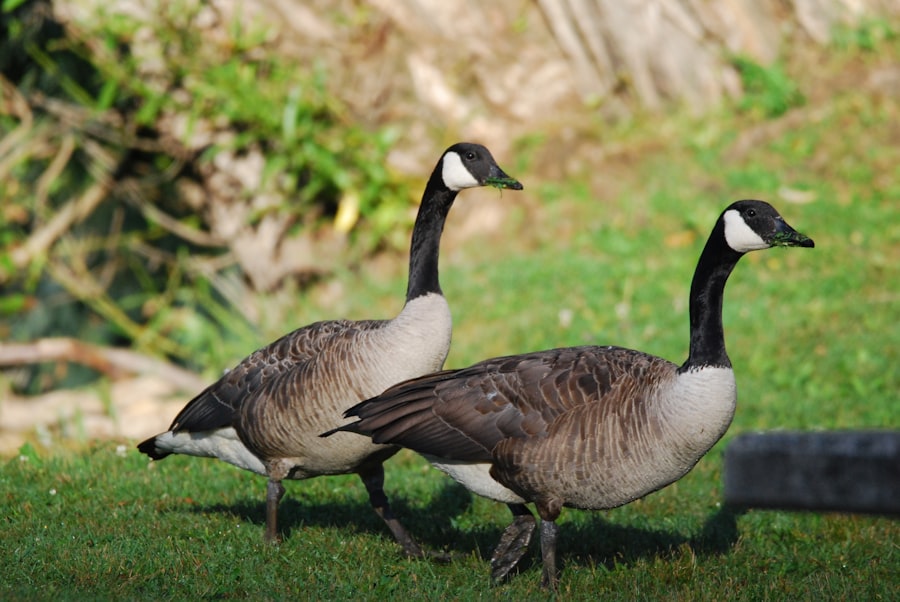
Landscaping can be used as a deterrent for geese by making certain areas less attractive to them. By planting tall grasses or shrubs near bodies of water, geese are less likely to approach these areas as they prefer open spaces where they have a clear line of sight. Additionally, creating barriers with landscaping features such as hedges or rocks can discourage geese from entering certain areas.
Another landscaping technique is the use of plants that are unpalatable to geese. Certain plants, such as yarrow or lavender, have strong scents or tastes that geese find unappealing. By incorporating these plants into the landscape, geese are less likely to graze on the vegetation.
The Role of Water Features in Attracting or Repelling Geese
Water features can either attract or repel geese, depending on how they are designed and maintained. Geese are naturally drawn to bodies of water for nesting and feeding purposes. However, certain water features can discourage geese from staying in the area.
One effective water feature is a pond aerator or fountain. These devices create movement and noise in the water, making it less appealing for geese to swim or nest. Additionally, installing a floating island in the middle of a pond can provide a safe nesting area for geese, away from areas where they may cause damage.
The Benefits of Regular Maintenance to Keep Geese Away
Regular maintenance is crucial in preventing geese infestation. By keeping grassy areas well-maintained and free of debris, geese are less likely to find these areas attractive for grazing. Regular mowing and trimming can also make it more difficult for geese to access food sources.
It is also important to regularly clean up any waste or droppings left by geese. Geese droppings can be unsightly and pose health risks, as they can contain bacteria and parasites. By promptly removing and properly disposing of goose waste, the risk of infestation can be reduced.
The Importance of Proper Waste Management
Proper waste management is essential in preventing geese infestation. Geese are attracted to areas with abundant food sources, including human food waste. By properly disposing of food waste and ensuring that garbage cans are securely covered, the likelihood of attracting geese to an area is reduced.
It is also important to educate the public about the importance of not feeding geese. Feeding geese can create a dependency on human food and encourage them to stay in an area longer than necessary. By discouraging the feeding of geese, their attraction to certain areas can be minimized.
The Role of Professional Services in Keeping Geese Away
In some cases, professional services may be necessary to effectively keep geese away. Pest control companies or wildlife management services have the expertise and resources to implement various control measures and provide ongoing maintenance.
Professional services can conduct a thorough assessment of the area and recommend the most appropriate control measures based on the specific needs and challenges of the location. They can also provide ongoing monitoring and maintenance to ensure that geese infestation is kept under control.
The Need for Consistency in Geese Control Measures
Consistency is key in keeping geese away. Geese are intelligent animals and can quickly adapt to scare tactics or repellents if they are not consistently applied. It is important to regularly monitor and maintain control measures to ensure their effectiveness.
Inconsistency in control measures can lead to geese infestation. If scare devices or repellents are only used sporadically, geese may become accustomed to them and no longer be deterred. Similarly, if physical barriers are not properly maintained, geese may find ways to bypass them.
In conclusion, there are various effective ways to keep geese away and prevent infestation. By understanding the behavior of geese and implementing physical barriers, scare tactics, repellents, landscaping techniques, water features, regular maintenance, proper waste management, and professional services, we can create an environment that is less attractive to geese. Consistency in implementing these control measures is crucial in ensuring their effectiveness. Taking action to prevent geese infestation is important for the well-being of both humans and geese.
If you’re looking for effective ways to keep geese off your lawn, you might find this article on Poultry Wizard helpful. It provides valuable insights on creating a secure and predator-proof floor for your chicken coop, which can also be adapted to keep geese away from your property. Check out their article on flooring options for chicken coops to discover practical solutions that can help deter geese and protect your lawn.
FAQs
What are some effective ways to keep geese off my lawn?
There are several effective ways to keep geese off your lawn, including using decoys, installing fencing, using repellents, and modifying the landscape.
What type of decoys can I use to keep geese away?
You can use a variety of decoys to keep geese away, including predator decoys, swan decoys, and coyote decoys. These decoys can be placed in strategic locations around your lawn to deter geese from landing.
What type of fencing is best for keeping geese off my lawn?
The best type of fencing for keeping geese off your lawn is a physical barrier that is at least 3 feet tall. This can include chain-link fencing, plastic mesh fencing, or electric fencing.
What type of repellents can I use to keep geese away?
There are several types of repellents that can be used to keep geese away, including sound repellents, visual repellents, and taste repellents. These can include noise-making devices, reflective tape, and bitter-tasting sprays.
How can I modify my landscape to keep geese away?
You can modify your landscape to keep geese away by removing any standing water, trimming grass and vegetation, and installing barriers such as rocks or shrubs. This will make your lawn less attractive to geese and discourage them from landing.
Meet Walter, the feathered-friend fanatic of Florida! Nestled in the sunshine state, Walter struts through life with his feathered companions, clucking his way to happiness. With a coop that’s fancier than a five-star hotel, he’s the Don Juan of the chicken world. When he’s not teaching his hens to do the cha-cha, you’ll find him in a heated debate with his prized rooster, Sir Clucks-a-Lot. Walter’s poultry passion is no yolk; he’s the sunny-side-up guy you never knew you needed in your flock of friends!

